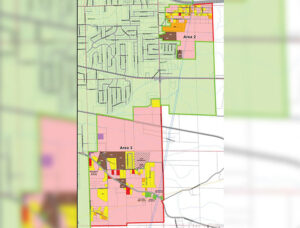Waggoner Engineering presented the Columbus City Council with a list of possible ARPA spending plans during Thursday’s work session, sparking a discussion about the scope of the firm’s plans versus the city’s available funds.
The city hired Waggoner in December as its consulting firm to handle its $5.6 million in federal American Rescue Plan Act funds. Later in December, the council approved about $55,000 for a needs assessment. Earlier this month, Waggoner presented a far-reaching draft that pulled in drainage, law enforcement, blighted property and transportation components.
However, there was some pushback from the council, especially Ward 4 Councilman Pierre Beard, over the approximately $1.3 million set aside for premium pay. Waggoner had not carved that out in its presentation.
Thursday, Waggoner representatives came back with three different options for the council to consider, all in the $125 million range. All three plans also rely on combining city, county and state ARPA funds and leveraging those as matching funds toward various grants. The Lowndes County Board of Supervisors has made no commitment to providing matching funds.
The first plan shuffled about $400,000 out of police salaries and moved it into dilapidated housing removal, but did not include premium pay. The second option included the earmarks for premium pay and reduced funding for infrastructure. The third configuration reduced the amount of premium pay to $650,000, but it still required the city to come up with some matching money from its general fund.
Waggoner Project Manager Stephen Thompson recommended the first option.
“It maximizes the ARPA funds you have with county, state and possibly federal funds,” he explained. “With the premium pay the matching funds for infrastructure will require money from the general fund.”
Premium pay is also ineligible for matching money from the state. The city has a “high probability” of getting the state and federal grants that the plan relies on, Thompson said.
Ward 3 Councilman Rusty Greene questioned how much of Waggoner’s presented plan actually revolved around the city’s available funds.
“We’re looking at turning $5 million in ARPA funds into about $20 million in ARPA funds (with the county and state match),” Greene asked. “The rest of the money you’re talking about getting us has nothing to do with ARPA. Y’all are getting that through grants, and that seems to me to be a whole other ball game.”
Beard questioned the allotment from Lowndes County. Waggoner’s plans all feature a large contribution from Lowndes County, ranging from $3.4 million to $4.7 million.
Board of Supervisors President Trip Hairston has previously told The Dispatch he thinks those figures are too high.
“We’re going over all these plans with the assumption that the county is going to give us $3 million or $4 million, and I don’t think that’s possible,” Beard said. “I feel like you guys are trying to sell us on your services and we need to get some work done.”
Thompson said the stormwater and drainage pieces were the primary area where the city’s ARPA money will be directly spent.
“The infrastructure project that we identified was storm water,” he said. “Most of the flooding comes from outside of the city. There are some major tributaries flowing into the city. If we can find ways to slow that water down with retention ponds … (the county) did express some interest in helping with that.”
Thompson said the estimate for stormwater work was $48 million now, but that number would likely go as high as $100 million.
“We need to talk to the county and see what they will give us,” said Ward 5 Councilman Stephen Jones. “If they’re not going to be on board we don’t need to even talk about them anymore.”
Stormwater “is what we initially recommend going to the state and the county for,” Thompson said. “… We need to have a sense of urgency about meeting with our state representatives, because they are waiting for you to make an ask.”
Thompson told the council he thought something needed to go to the legislature by Feb. 23.
The council’s next meeting is Tuesday.
You can help your community
Quality, in-depth journalism is essential to a healthy community. The Dispatch brings you the most complete reporting and insightful commentary in the Golden Triangle, but we need your help to continue our efforts. In the past week, our reporters have posted 37 articles to cdispatch.com. Please consider subscribing to our website for only $2.30 per week to help support local journalism and our community.







